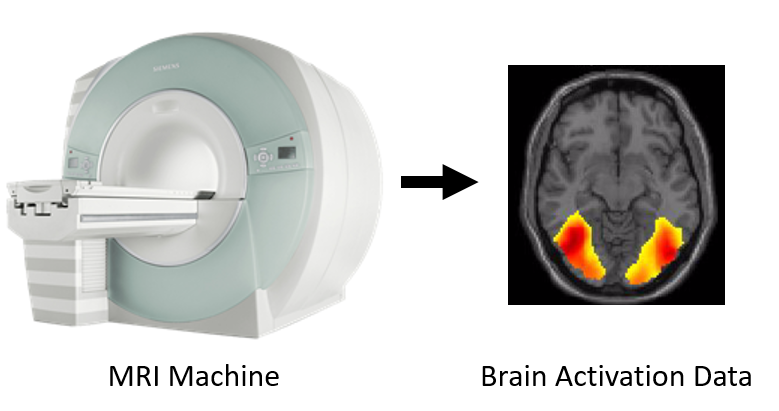
We provide measurements of brain responses using the technique of functional magnetic resonance imaging (fMRI) for millimeter spatial resolution. This technique measures brain activity indirectly by detecting changes in blood flow associated with brain activity. fMRI is a core technique in cognitive neuroscience to observe the human brain in action noninvasively.

Figure 1 | Challenge data. a, Multimodal movie stimuli, consisting of visual frames, audio samples, and time-stamped language transcripts. b, Whole-brain fMRI responses (time series) to the multimodal movies in four subjects.
The Challenge data is based on the CNeuroMod dataset, which comprises extensive single-subject neural response samples collected during a range of controlled and naturalistic tasks and stimuli. The CNeuroMod dataset’s unprecedented size, combined with the multimodal nature and diversity of its stimuli and tasks, makes it an ideal training and testing ground to build robust encoding models of fMRI responses to multimodal stimuli that generalize out of their training distribution.
Challenge participants will train and evaluate their encoding models using a subset of CNeuroMod’s data which includes almost 80 hours of multimodal movie stimuli and corresponding fMRI responses. Training data are from the CNeuroMod Friends dataset, for which subjects watched all episodes from the first six seasons of the Friends sitcom, plus three feature films and a documentary. Evaluation data are from season seven of the Friends dataset, and from the viewing of out-of-distribution (OOD) movies.
The stimuli consist of movie visual frames, audio samples, and time-stamped language transcripts (Figure 1a). The neural data consist of whole-brain fMRI responses for four CNeuroMod subjects (sub-01, sub-02, sub-03 and sub-05), normalized to the Montreal Neurological Institute (MNI) spatial template (Brett et al., 2002), and processed as time series whose signal is assigned to 1,000 functionally defined brain parcels (Schaefer et al., 2018) (Figure 1b). Further information on the challenge stimuli and fMRI data is provided on the challenge data repository and development kit.
The CNeuroMod data used in the Algonauts 2025 challenge has been openly shared under a Creative Commons CC0 license by a subset of CNeuroMod participants through the Canadian Open Neuroscience Platform (CONP), funded by Brain Canada and based at McGill University, Canada. Participants provided informed consent both to participate in the CNeuroMod study conducted at CIUSSS du Centre-Sud-de-l’île-de-Montréal and, separately, to share their data through the CONP. The CC0 license enables the Algonauts 2025 team to freely create and distribute derivative works, without restrictions, and the Algonauts 2025 challenge data is likewise distributed under a CC0 license.